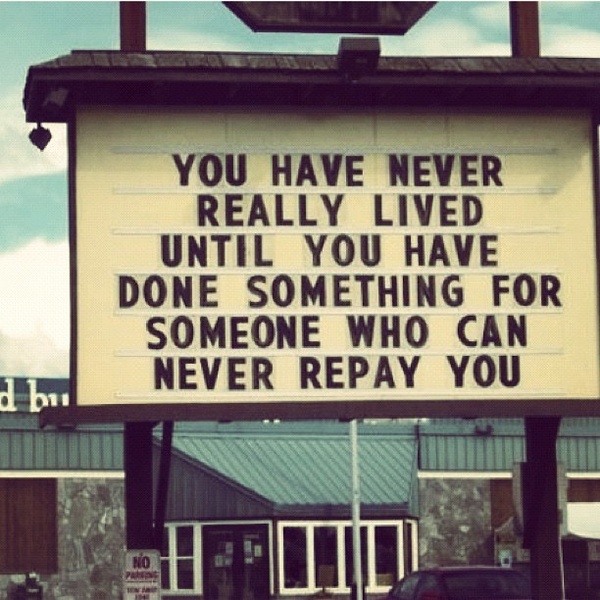Trusting Strangers For The Better Good.
Have you ever watched those feel good videos on YouTube on a lazy Sunday afternoon with a cup of tea and a side of biscuits? Well, I have. I’m talking about those random acts of kindness videos where some random guy gives flowers to mothers on the street walk or pranks that make you laugh or smile. Growing up and identifying myself as a cis-female, I have trust issues with strangers, and obviously it’s common that most people do. You don’t know if they’re serial killers, stalkers or some clingy creep that just wants to talk to so they can stare at your beloved assets. How can you differentiate the good apples from the bad?
How can you give your complete trust to someone that may change your future, no matter how long or short that future may be, that can mean a day, a week or a month or even more? In the 2009 documentary Us Now directed by Ivo Gormley, explores the possibilities of humankind using social media as a form of resource to connect to other people and learning from them in the process. There is an evergreen of knowledge that society as a whole have, so why not share it?
People are ‘connecting on the basis of relevant similarities’ (MT Rainey 2009), as social media advance through the years. ‘Connecting on the basis of relevant similarities’ (MT Rainey 2009), sounds like the blurb for dating applications doesn’t it? Us Now investigates the notion of being more involve in communities, and in society in general. Sometimes, people ‘need help from a friendly stranger’ (MT Rainey 2009) when they are either lost or feel uncertain about something.
There are people out there who are willing to help out those in need and when I say ‘help’, I don’t mean by giving money to those mental health organisations, donating to those poverty stricken kids in Africa or volunteering at the homeless shelter. I mean helping those in need, those people who need help right there and right then. It’s help that’s manageable and cost-effective for you, ‘its quite nice to give someone directions for example or by imparting a bit of your knowledge’ (Mikey Winkove 2009). In return of helping people, they feel good about themselves, making them feel all warm and fuzzy.
 Freedom and control’ (pp. 37) can be a couple of reasons why we use social media. Social media allows us to voice our opinions, there’s a reason why anyone who works in advertising says the most powerful tool is the word of mouth of others, ‘we have a mass-consumer technology that supports this and we’re only now beginning to discover what we can do with it’ (Lee Bryant 2009). There’s a reason why there are reviews on everything from books, iTunes applications and technological products, ‘the web can create large communities of informal knowledge and system ties it to make it very useful’ (Charles Leadbeater 2009). Trusting people to network on a peer-to-peer basis of helping one another using social media is still relatively new, people are using ‘social media to bring the gift economy out in the open’ (Sofia Parker 2009).
Freedom and control’ (pp. 37) can be a couple of reasons why we use social media. Social media allows us to voice our opinions, there’s a reason why anyone who works in advertising says the most powerful tool is the word of mouth of others, ‘we have a mass-consumer technology that supports this and we’re only now beginning to discover what we can do with it’ (Lee Bryant 2009). There’s a reason why there are reviews on everything from books, iTunes applications and technological products, ‘the web can create large communities of informal knowledge and system ties it to make it very useful’ (Charles Leadbeater 2009). Trusting people to network on a peer-to-peer basis of helping one another using social media is still relatively new, people are using ‘social media to bring the gift economy out in the open’ (Sofia Parker 2009).
There is a growing number of online services, websites and applications that allows a person to help others, ‘once you deliver something that actually allows people to make a decision, it’s incredible how compelling it is how people are to participate’ (Saul Albert 2009), Us Now examines how the internet has become a playground for adults to gain and pass on knowledge to one another by participating in an online – and at times, offline – community. Whether that might be a couchsurfing community, a website about motherhood or a soccer team, attention is given to those who feel they need to participate in an event, comment or feel the need to inform others of a place or product. And it appears that the opinion of the majority rules.
References:
Banyak Films 2009, Us Now, video recording, viewed 5 August 2014, <http://vimeo.com/4489849>.
Hinton S & Hjorth L 2013, ‘What is Web 2.0?’, Understanding Contemporary Culture Series: Understanding Social Media, London, 31 July 2014, SAGE Publications Ltd, pp. 37.

